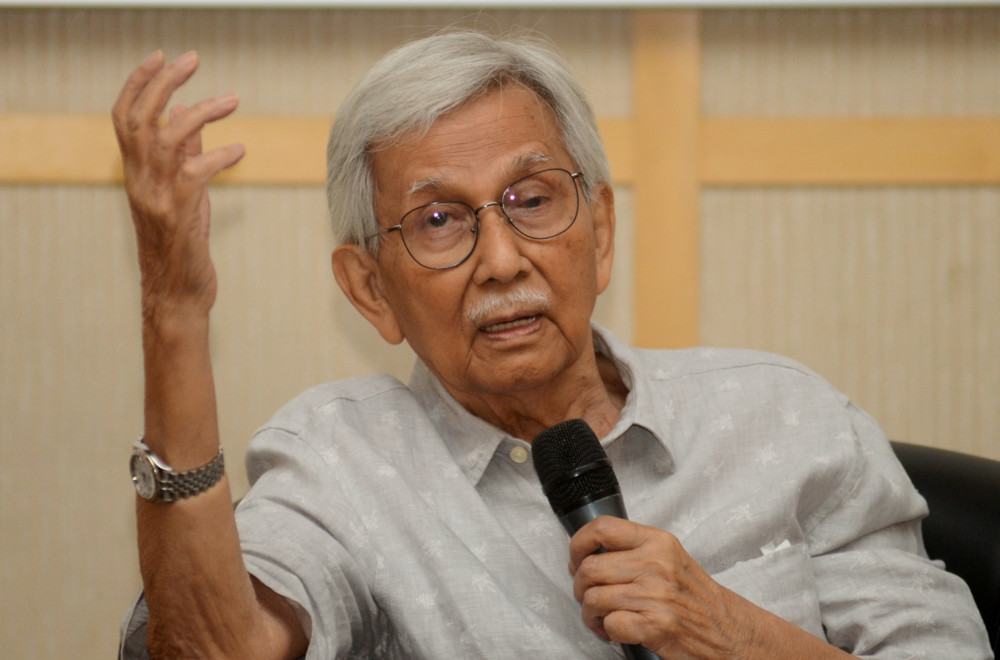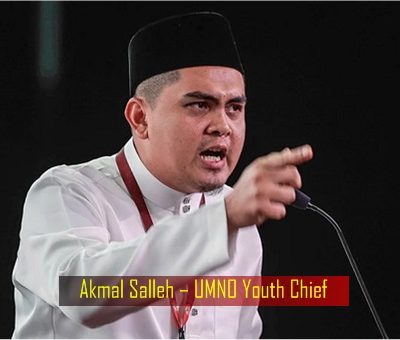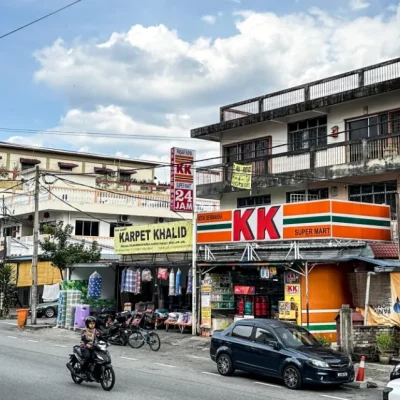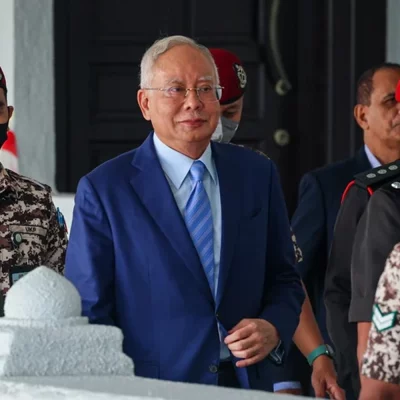In the 1980s and 1990s, Daim Zainuddin, a diminutive lawyer, politician, and businessman with close ties to Mahathir Mohamad, was the highest-flying of all the cronies allied with the then-prime minister. Born in 1938, he shared Mahathir’s home province of Kedah.
He was twice named finance minister as well as the steward of the once-powerful United Malays National Organization’s finances, using his proximity to power to snap up banks, construction firms, real estate, ports, palm oil plantations and other businesses, using the 1971 New Economic Policy that required Chinese interests, which dominated the high ground of the Malaysian economy, to cede a significant portion of their holdings to Bumiputeras, indigenous peoples who are granted special rights under the constitution, mainly ethnic Malays.
Today, at age 85, seriously ill and undergoing kidney dialysis three times a week, Daim has largely disappeared from public view. He is likely to be charged in court, possibly as early as tomorrow, January 21, on charges of having concealed millions of dollars in assets hidden overseas, some details of which turned up in October of 2021 in the so-called Pandora Papers, the 11.9 million documents leaked mostly from the Panamanian law firm of Alemán, Cordero, Galindo & Lee, that were published by the International Consortium of Investigative Journalists.
What the ICIJ found is believed to be a tiny portion of Daim’s fortune. Many believe him to be the country’s richest individual although he appears nowhere on Fortune Magazine’s list of the country’s 50 top tycoons. His assets in Kuala Lumpur, including a 60-storey office building, have been seized and his accounts have been frozen. The Malaysian Anti-Corruption Commission has also raised suspicions over the alleged misappropriation of $480 million in state funds dating back to the 1990s, which he has denied.
The question coursing through Malaysia’s political community is why Prime Minister Anwar Ibrahim has chosen to go after the ailing Daim, who is spending a considerable amount of time in the hospital and whose alleged transgressions took place at least 22 years ago in a country rife in present-day corruption, sliding down the Transparency International corruptions perception in every year since 2015.
A previous prime minister, Najib Razak, is serving 12 years in prison over the 1Malaysia Development Bhd scandal amid rumors a pardon might spring him to help out Anwar’s political fortunes with the Malay electorate. Two other trials for Najib have seemingly faded into the far distance. Anwar’s own deputy prime minister Ahmad Zahid Hamidi, has mysteriously escaped from an ongoing trial in which he was charged with 45 counts of criminal breach of trust, abuse of power, and money laundering involving a total of RM114 million (about US$27.4 million) in funds from the Yayasan Akalbudi charity.
“It’s score-settling,” said a highly-placed lawyer based in Kuala Lumpur, a consensus held in both the legal fraternity and the business world, although Anwar himself insists that the government and attorney general are only going where the law takes them. Daim’s second stint as finance minister began on January 7, 1999, three months after Anwar was sacked by Mahathir and later imprisoned for six years on corruption and sexual perversion charges that have been dismissed by international human rights organizations as trumped up to ruin Anwar’s political career.
Daim, so closely tied to Mahathir, is regarded as part of the ruling cabal that repeatedly wrecked Anwar’s career. Anwar, once Mahathir’s acolyte, has feuded with Mahathir, now 98, ever since he was sacked in the 1997-1998 Asia Financial Crisis. Mahathir thwarted him from becoming prime minister following the Reformasi coalition’s 2018 defeat of the ruling Barisan Nasional and its biggest component party the United Malays National Organization, reneging on a promise to step down as premier. Daim was chief of the five-member Council of Eminent Persons advising the new government. Daim himself has publicly accused Anwar of a “political witch hunt.”
Last week, Mahathir’s son Mirzan was also summoned to the headquarters of Malaysia’s Anti-Corruption Commission, which is said to be investigating Mirzan’s business activities in what the Bloomberg news service called “a sign of Prime Minister Anwar Ibrahim’s widening anti-graft campaign against his rivals.” The MACC said Mirzan has been given 30 days to declare all assets in his possession within 30 days as part of the MACC’s probe into information from the Pandora Papers as well as his business activities.
In a January 9 application for judicial review of the MACC’S allegations against Daim and members of his family, his lawyers argue that while 12 individuals are named – including Ahmad Zahid Hamidi – in the Pandora Papers, Daim and his family are the only individuals under investigation by the anti-corruption agency. If any charges are to be instituted, “such charges would be unconstitutional and void because they will not receive a fair trial, having regard to the delay of some 22 years in their institution, thereby infringing the fundamental right of ‘personal liberty’ under the Federal Constitution.”
That said, of all the ethnic Malays that Mahathir sought to leverage into positions of power in Malaysia’s business world during his first 22 years in power, which ended in 2003, Daim Zainuddin was the one who not only attained enormous leverage, but was instrumental in propping up UMNO, serving as its finance chairman. Many of the other Bumis picked by Mahathir ran their concerns into the ground, to be bailed out by the government or wound up.
Daim used the New Economic Policy’s stipulation of divestment of Chinese firms to ethnic Malays to take control of such institutions as the Chinese-owned United Malayan Banking Corporation, then the country’s second largest bank. Much of Daim’s financial doings are hardly a secret. They were reported in detail by the now-defunct Asian Wall Street Journal, the New York-based publication’s Asian edition, by reporter Raphael Pura, with little or no effect. They can still be found in the publication’s archives.
The effectiveness of the 54-year-old New Economic Policy and its look-alike successors has to be questioned. Ethnic Malays today make up 69.9 percent of the country’s population against the 23 percent Chinese, and 8 percent who are other nationalities, mostly ethnic Indian. Although the 54-year-old New Economic Policy was designed to engineer 30 percent of the country’s economic wealth for Bumiputeras, 42 of Fortune’s 50 richest individuals or families are still Chinese.
According to the ICIJ findings, as reported in local media including the independent news portal Malaysiakini, Daim and his family including his sons Amin and Amir and his wife Na’ima Khalid are the beneficiaries of ZA Star Trust, which held assets worth US$52.5 million as recently as 2020, with investments in three British Virgin Islands companies. Two of those companies own two properties in London, including an eight-floor office building near St. Paul’s Cathedral acquired in 2014 for $50.8 million, according to U.K.’s property register. The third BVI company indirectly owns shares in nine entities registered in Delaware and Massachusetts that were used to invest in hotels, parking lots, and other commercial and residential property. The trust’s financial statements show that the trust received a US$47 million loan from another entity called Adam Zeta Trust. The files don’t state the owner of Adam Zeta Trust or when the loan was made. He is listed as a signatory to other trusts as well.
Daim has consistently denied wrongdoing, saying he had always paid taxes on his investments and properties. “I’ve retired from business for some time already, and trusts are part of estate planning,” he told local media. He insists he has paid taxes in all jurisdictions where he conducts business. He also said that not all firms he has links to are owned by him, explaining that they are partially controlled by his kin.
Source : Asia Sentinel
Daim in hospital, MACC defers questioning over wealth sources
Former finance minister Tun Daim Zainuddin’s meeting with the Malaysian Anti-Corruption Commission (MACC) yesterday to record his statement about the sources of his wealth, has been postponed after the 85-year-old was hospitalised.
Utusan Malaysia reported unnamed MACC sources who said the interview was supposed to be held yesterday in relation to ongoing investigations about Daim’s wealth.
“We were informed that he was admitted to the hospital last week, so we have to set a new date,” one of the sources was quoted as saying in the news report published last night.
The Utusan report did not disclose why Daim was hospitalised or the details that led to him being questioned by MACC investigators.
Daim, a successful businessman and lawyer, was finance minister from 1984 to 1991.
He has been featured prominently and is said to be closely linked to former two-time prime minister Tun Dr Mahathir Mohamad.
National news agency Bernama reported that Daim and his company, Ilham Tower Sdn Bhd, filed a legal challenge last Wednesday against the MACC and the public prosecutor to stop ongoing corruption investigations based on the “Pandora Papers” – the findings by the International Consortium of Investigative Journalists in October 2021 based on its analysis of millions of leaked confidential documents on thousands of offshore companies, including those linked to politicians and public officials in 91 countries and territories.
The MACC invoked Section 36(1)(a) of the Malaysian Anti-Corruption Commission Act 2009 to serve a notice to Daim to formally declare in a sworn statement all his assets, domestic and abroad within 30 days of June 7, 2023.
Section 36(1)(a) states that an MACC officer can issue a written notice to require the person to give a statement in writing on oath to identify all properties locally and abroad belonging to him or where he has an legal or equitable interest in and the date and method of acquisition, if he has reasonable grounds to believe based on investigation that any property held or acquired by any person is connected to or results from an offence under the same law.
Also named as applicants were Daim’s family – his four children Asnida, 62; Md Wira Dani, 45; Muhammed Amir Zainuddin, 28; Muhammed Amin Zainuddin, 25; and his wife Toh Puan Nai’mah Abdul Khalid, 66.
Daim has denied any wrongdoing in amassing his wealth and claimed the investigation to be politically motivated.
The Coverage Malaysia






